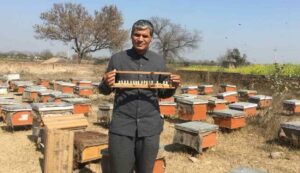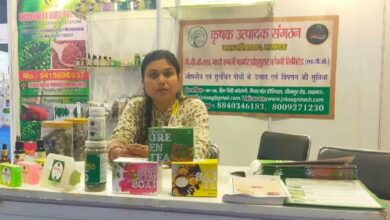Beekeeping: Jagpal Singh Phogat trained more than 700 farmers in beekeeping
Beekeeping: Progressive farmer Jagpal Singh Phogat, of Manikpur in the Chitrakoot area of Uttar Pradesh, is addressing the urgent issues facing the country’s agriculture industry. The agricultural landscape is severely strained as farmers deal with problems including water shortages, unpredictable weather patterns, and the negative consequences of chemical fertilizers, which are used by over 99% of farmers. Decreased agricultural yields, heightened susceptibility to climate change, and deteriorating environmental health are the outcomes of these interrelated variables. Government assistance programs do exist, but Jagpal feels they haven’t done enough to address the pervasive difficulties faced by farmers.

“I feel terrible about the majority of our farmers’ present circumstances. He underlines, “Our farmers must be very affluent. Devoted to converting these obstacles into chances, Jagpal is spearheading programs that enable farmers and encourage sustainable methods, proving that adaptability and ingenuity can clear the path for a more promising future in the agricultural sector.
While producing conventional crops, raising dairy cattle, and raising poultry are still common, beekeeping is a viable alternative source of income. Beekeeping boosts crop pollination and raises farmers’ income via the production of honey, wax, and other byproducts. These benefits improve agricultural productivity and promote environmental sustainability. Beekeeping is a dynamic business model that has the ability to herald a new age of sustainable agriculture and rejuvenate rural economies due to its cheap initial investment and high profit margin.
After spending more than 15 years in the field of education, Jagpal Singh Phogat saw the difficulties that farmers faced on a daily basis and wanted to change things. “Considering my experience in agriculture, I came up with the concept of beekeeping. It gives our farmers many advantages but just needs a one-time investment,” he says. His desire to address the issues encountered by small-scale farmers led him to make a big move from teaching English at a private school to beekeeping. “After 15 years as a teacher, I realized that farming required creativity. The solution was beekeeping.”
The Beekeeper’s Promise
Beekeeping is a business strategy with enormous potential that goes beyond simple agricultural practices. It is possible for farmers to start a beekeeping business without any land and make money from honey and other byproducts. Given that India is now the world’s fifth-largest producer of honey, farmers have a big market potential. “Entire families may benefit from a consistent income from beekeeping. After they become experts in their trade, it helps farmers to think like entrepreneurs,” says Jagpal Singh Phogat.

Jagpal’s excursion serves as evidence of beekeeping’s profitability. “Last year, I myself made Rs 1.5 crores. In Uttar Pradesh, Rajasthan, Jammu, and Haryana, I raise bees. In these states, I install bee boxes, and each one generates more revenue for me. In these states, I am supported by a staff of more than thirty individuals. Bee farming is quite successful; even a tiny farmer like me, with just 2.5 acres of land, can earn Rs 1.5 crores a year,” he says.
Educating the Public
In addition to being a beekeeper, Jagpal has taught the art to more than 700 others. To further the adoption of this sustainable approach, he works with The Art of Living’s Sri Sri Institute of Agricultural Sciences and Technology (SSIAST). Over 2.2 million individuals in India have previously received natural agricultural practices training from SSIAST. “With the help of our volunteer base, we are setting up stalls at various locations to showcase the benefits of bee farming,” Jagpal says. Through empowering them and demonstrating to them the potential of beekeeping as a successful business model, these projects seek to uplift farmers.
Advice for future beekeepers
- If farmers are interested in beekeeping, Jagpal has some useful tips to share:
- To get the most advantages, practice scientific beekeeping.
- Plant kinds that provide pollen and other byproducts, since there is a market for them.
- Commence modestly by establishing a minimum of 10 bee hives, which will aid in agricultural pollination and provide honey for individual use.
The success story of Jagpal Singh Phogat serves as an example of how beekeeping may change India’s agricultural landscape. His advocacy of this sustainable technique benefits many farmers nationwide in addition to increasing his personal profitability. By providing training and working in partnership with institutions such as the Sri Sri Institute of Agricultural Sciences and Technology, Jagpal is preparing the next generation of farmers to accept beekeeping as a sustainable and profitable business model. His story is a motivational reminder that creative solutions, like beekeeping, may provide India’s rural community financial security and a more promising future.





